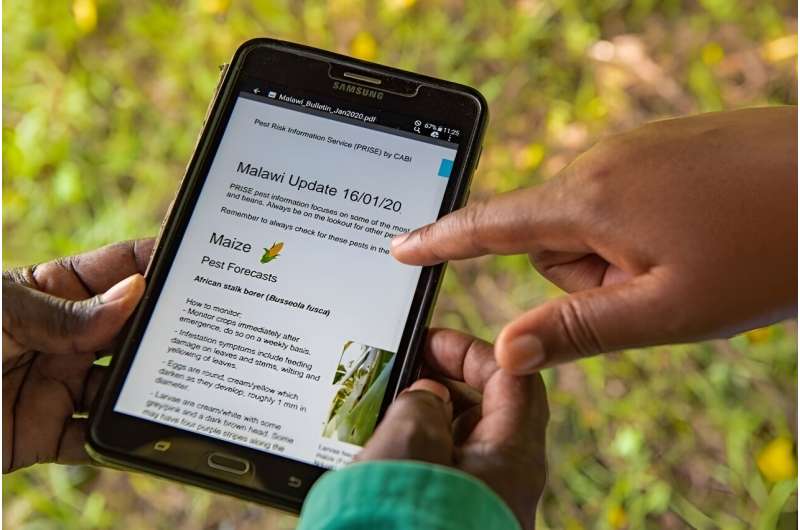This article has been reviewed according to Science X's editorial process and policies. Editors have highlighted the following attributes while ensuring the content's credibility:
fact-checked
proofread
African smallholder farmers benefit from reduced crop losses and higher incomes from a novel pest alert service

A newly published review of the CABI-led Pest Risk Information Service (PRISE) project shows that smallholder farmers in four African countries who received pest alerts created using earth observation data benefitted from reduced crop losses and higher incomes compared to farmers who did not.
Crop pests are the major cause of loss of smallholder productivity resulting in negative impacts on livelihoods—the estimated the economic impact of invasive alien pests alone on Africa's agricultural sector is USD $65.58 billion a year.
This review is a keystone paper that brings together six years of work on PRISE. The highlight of the review, published in the Journal of Integrated Pest Management, shows that smallholder farmers in four African countries really benefit from the service.
For instance, in respect of 2,000 smallholder maize farmers in Kenya surveyed in 2021 who received pest alerts for fall armyworm (Spodoptera frugiperda), a harvest of 2,089 kg/ha was achieved with an income of 18,020 Ksh/ha. This is compared to smallholder farmers who did not receive these alerts where only a harvest of 1,988 kg/ha was gained with a lower income of 15,733 Ksh/ha.
In recent decades, significant progress has been made that allows farmers to access important information to improve crop health, including how to manage crop pests.
PRISE alerts augment the advice (the what) already being serviced to farmers with their bespoke optimum 'time to action window' (the when) allowing farmers to prepare for pest threats in advance so increasing the efficiency and efficacy of interventions.
This in turn reduces the reliance on 'in case' action, which is time-consuming, costly, and often ineffective, the scientists say.
PRISE, which began in 2017, was carried out by a team of scientists from Africa and Europe for farmers in sub-Sharan Africa. In Europe, the partners include CABI and Assimila Ltd, who work with four in-country lead partners from government agencies in Africa.
These include the Kenyan Agricultural and Livestock Research Organization (KALRO); the Plant Protection and Regulatory Services Directorate (PPRSD) and Crop Research Institute (CRI) in Ghana; the Department of Agriculture Extension Services in Malawi; and the Zambia Agricultural Research Institute (ZARI).
In the early part of PRISE, technical help was also provided by the Science and Technology Facilities Council/Center for Environmental Data Analysis (2017–2022), and King's College London (2017–2020).
Data from a variety of sources
PRISE works by gathering data from a variety of sources including satellite observation, weather data, geographic data, and details about the seasonal occurrence, abundance and biology of pests that include the tomato leafminer (Phthorimaea absoluta).
This information is then combined in a 'data cube' to run algorithms, which ultimately produce pest time to act information. The information generated is used to give farmers timely alerts and advice to help manage local pest outbreaks as part of their Integrated Pest Management (IPM) plans.
Forecast time to act
Using downscaled and processed Earth Observation data to drive the models, PRISE partnered with African national agencies to communicate pre and in-season pest alerts that forecast the time to act against key insect pests.
Alerts were designed to be integrated into country-specific Good Agricultural Practice (GAP) recommendations to provide a complementary package to agricultural stakeholders.
For example, by converting time-to-act information into maps coupled with PlantwisePlus GAP information, bulletins (PDF documents) were developed twice a month, combining the PRISE action alert with relevant diagnostic and management advice from Pest Management Decision Guides.
Benefits more pronounced for male-headed households
Dr. Bryony Taylor, Digital Development Coordinator, Modeling and Data Science at CABI and an author of the review, said, "Results varied across countries and crops, as was expected. Nevertheless, overall positive impact was noted for some but not all farmers who had received the PRISE forecasts—either with or without other GAP information, especially in relation to a reduction in crop losses.
"The differences were more pronounced for male-headed households as compared to those headed by women, with significant reductions in crop losses for men for all crops and all countries apart from bean and tomato crops in Malawi.
"However, for women, the only significant reduction in crop losses were observed in Kenya for all crops, and in Zambia for maize. No significant changes in levels of crop losses were seen for any crops in female-headed households in Malawi."
The scientists stress that time for monitoring pests is limited as smallholder farmers, especially women who frequently do most of the work, are already heavily burdened by agriculture and household workloads.
Further work needed to target female farmers
They add that further work will be needed with dissemination partners to target women to sign up to extension messaging services to ensure they receive the time to act upon messages directly.
Furthermore, to enable women farmers to benefit from the messaging, it will be necessary to work with partners to address the social norms that constrain women's access to land, credit, and farming inputs, so that they are able to respond to the time to act on the messaging in full.
More information: Charlotte Day et al, Forecasting the population development of within-season insect crop pests in sub-Saharan Africa: the Pest Risk Information Service, Journal of Integrated Pest Management (2024). DOI: 10.1093/jipm/pmad026
Provided by CABI





















